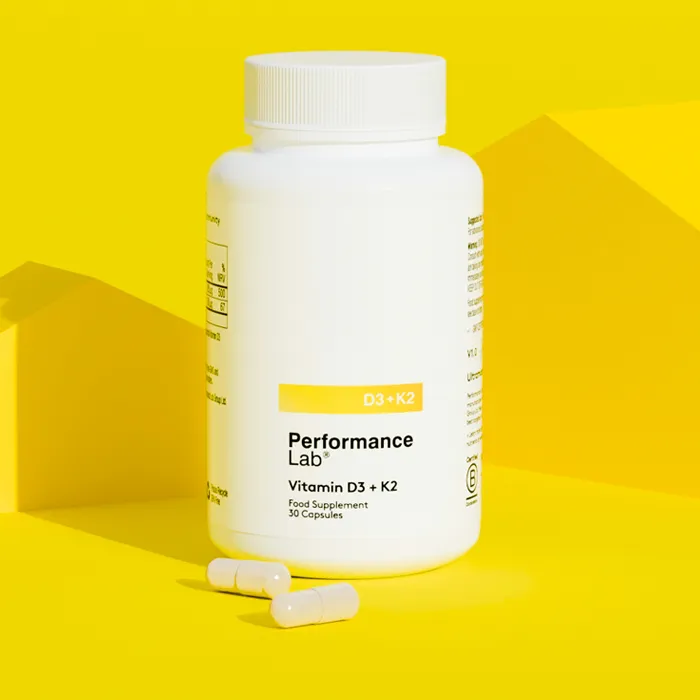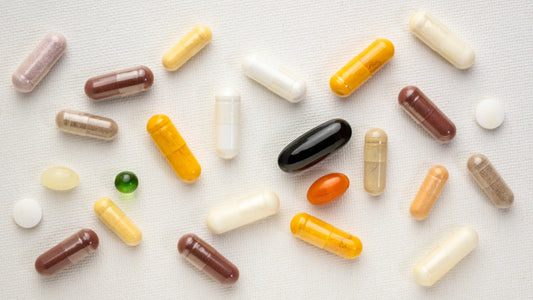Vitamin D is an essential nutrient for everyone, but it's especially important for several key aspects of men's health: muscle, testosterone, virility and more. In this article, we're focusing on vitamin D benefits for men, deficiencies in men, and how vitamin d supplements and lifestyle changes can bring your status back up to par.
Let's get to it!
Key Takeaways
- D3 supports testosterone within normal range, muscle function, mood, immunity, and bone health.
- Many men run low—limited sun, indoor work, higher latitudes, and darker skin increase risk.
- D3 works synergistically with vitamin K2 for calcium management and cardiovascular health.
- Test levels and supplement consistently with food for best outcomes.

Health Benefits of Vitamin D for Men
Vitamin D3 is also known as cholecalciferol or the “sunshine vitamin.” The body produces vitamin D when the skin is exposed to UVB rays from sunlight. In the diet, it is found in fatty fish like salmon and mackerel, fortified dairy products and plant milks, egg yolks, beef liver, and certain types of mushrooms.
Vitamin D benefits include enhancing bone strength, muscle strength, boosting immune function, regulating mood, supporting heart health, and helping to maintain overall wellness. Maintaining adequate testosterone levels is another crucial benefit of vitamin D for men. Let’s take a look at vitamin D3 benefits in the context of men’s health, specifically.
Bone Health

Vitamin D is great for maintaining healthy bones that literally support masculine wellness. Vitamin D strengthens bones by helping the body absorb calcium and phosphorus: two crucial minerals for bone growth. Plus, Vitamin D is involved in bone remodeling by osteoblasts and osteoclasts, the cells responsible for forming and resorbing bone tissue.(1) This may help to protect against bone fractures, which may be more of a concern as active men grow older.
Testosterone
Maintaining adequate Vitamin D levels can support optimal testosterone levels and testosterone production, which in turn helps to enhance men’s muscle development, bone density, and libido, as well as reducing fat mass and supporting weight management. Human clinical research has shown regular D intake raises blood levels of free testosterone, bioactive testosterone and total testosterone.(2) Learn more about testosterone supplements.
Muscle Function

Researchers believe Vitamin D may help muscle mass, strength and performance due to its role in stimulating growth of skeletal muscle fibers.(3,4) It has been suggested to help with age-related muscle weakness in more mature men, as well. Researchers have also noted that Vitamin D deficiency may lead to degeneration of muscle fibers that diminishes strength and weakens physical performance.(5)
Male Sexual Health
Optimal Vitamin D levels are associated with enhanced sexual and reproductive health in men. Researchers have found vitamin D receptors and metabolizing enzymes in the testis and spermatozoa, suggesting that it may regulate testis hormone production, sperm quality, semen quality, sperm function, and male fertility.(6)
In addition, A 2021 study published in the World Journal of Men’s Health suggests that erectile function, which is a key predictor of male sexual health, directly relies on adequate intake of vitamin D.(7)
Immune Function
Everybody could use a little immune support these days. But if you’re a man who works out at the gym, you should know that intense training can weaken the immune system.(8) Vitamin D deficiency has also been linked to a misfiring immune system and increased risk of infections.(9)
Increasing Vitamin D levels may help because it activates and regulates immune cells for a healthy and balanced immune response. Vitamin D even helps immune system barrier functions (skin and mucous membranes) that are a first-line defense against pathogens.
Mood
Vitamin D receptor sites are widespread in the brain, suggesting that the vitamin plays a vital role in brain function.(10) Vitamin D helps regulate the synthesis of neurotransmitters like serotonin, melatonin dopamine, which are crucial for mood regulation, feelings of well-being and restful sleep, and maintain blood pressure.(11)
Studies have found that vitamin D deficiency can contribute to negative emotions and depressive feelings; and that people with major depressive disorder and low vitamin D levels are most likely to see the greatest mood benefits from supplementation.(12,13)
Cardiovascular Health

Vitamin D3 benefits for men include broad-range support for cardiovascular health. This is crucial as heart problems are a leading health issue for men. Adequate levels of Vitamin D may help maintain blood pressure in a normal range and support smooth muscle function in the cardiovascular system.
Clinical trials suggest that low levels of Vitamin D are associated with an increased risk of heart attacks, congestive heart failure, and strokes, highlighting the importance of maintaining sufficient levels for cardiovascular health in men.(14)
How much Vitamin D do Men Need?
The Recommended Dietary Allowance (RDA) for Vitamin D varies depending on age, sex, and other factors.
-
According to general guidelines provided by the National Institute of Medicine, adult men up to age 70 should consume 600 IU (15 mcg) of vitamin D per day. After age 70, the RDA goes up to 800 IU (20 mcg).
These values are set to ensure adequate levels of Vitamin D to promote bone health and maintain calcium balance.
Some experts suggest more vitamin D than the amounts listed might be beneficial, especially for those at risk of deficiency due to limited sunlight, darker skin, obesity, or certain health conditions.
However, higher doses should be taken under medical supervision to avoid the risk of toxicity, since D3 is a fat-soluble vitamin D and can accumulate in the body.
Many men have low vitamin D levels.
The average daily intake of Vitamin D can vary widely based on dietary habits, geographical location, sun exposure, and the use of supplements. However, studies have shown that many men do not get enough Vitamin D through diet alone.
According to the United States National Institutes of Health, 92% of adult men consume less than 400 IU (10 mcg) of Vitamin D per day.(15)
These figures reflect dietary intake only and do not include vitamin D from sun exposure or supplementals. Still, the gap between dietary intake and the RDA highlights the challenge of getting enough Vitamin D.
If you're concerned about low vitamin D levels that are a risk factor for multiple health concerns, talk to your doctor. A simple blood test can tell you if your levels are low.
How Men Can Get Enough Vitamin D
Sun Exposure

It's called the sunshine vitamin with good reason: men can safely increase their Vitamin D levels through sensible sunlight exposure. This means spending about 10 to 30 minutes in the midday sun several times per week. Lighter skin tone requires less time in the sun; darker skin requires more.
Immediately after a short period of time in the sun, apply SPF 30+ sunscreen to protect the skin from harmful UV rays and minimize the risk of skin damage.
Consult with a doctor before full-body sunlight exposure, especially if you have skin health concerns. Or, you could just consider taking vitamin D in supplement form.
Did you know? Researchers have estimated that the body can produce 10,000 IU of Vitamin D from light exposure on a sunny day.(16)
Consume Vitamin D Foods

Want to correct low vitamin D levels via dietary sources and fortified foods? Here is a list of common foods naturally rich in Vitamin D, along with the approximate amount of Vitamin D each food supplies per serving:
-
Salmon (wild-caught): About 988 IU per 3.5 ounces (100 grams).
-
Mackerel: Around 643 IU per 3.5 ounces (100 grams).
-
Sardines (canned): Approximately 272 IU per 3.5 ounces (100 grams).
-
Cod Liver Oil: About 1,360 IU per tablespoon.
-
Tuna (canned): Roughly 268 IU per 3.5 ounces (100 grams).
-
Egg Yolks: Around 44 IU per yolk.
-
Fortified Milk: Generally 100 to 120 IU per 8 ounces (about 237 ml).
-
Fortified Yogurt: Approximately 80 to 100 IU per 6 ounces.
-
Fortified Cereals: Varies, but typically around 40 to 100 IU per serving.
-
Beef Liver: About 42 IU per 3.5 ounces (100 grams)
-
Mushrooms (UV-exposed): Vitamin D content varies; some types can provide as much as 400 to 1,000 IU per 3.5 ounces (100 grams). UV-exposed mushrooms include shiitake, button (white button, cremini, portobello), maitake, chanterelle, and morel.
These food sources can help individuals increase their Vitamin D intake, particularly in conjunction with adequate sunlight exposure. But supplementation may be advisable for some people – including vegetarians, vegans and those with severe deficiency – to get more vitamin D.
Vitamin D Supplements for Men to Consider
There are a lot of vitamin D supplements on the market, including vitamin D3 supplements. The most important feature to look for is a vitamin D3 (cholecalciferol) supplement rather than a vitamin D2 (ergocalciferol). Research suggests that vitamin D3 is more effective at increasing blood levels and up to 87% more potent than D2.(1 Also be wary of high dose supplements, as excessive intake can lead to toxicity.
Let’s look at some high-quality supplements that deliver the preferred D3 form in carefully calibrated doses.
Performance Lab® NutriGenesis Multi for Men

NutriGenesis® nature-identical vitamin and mineral essentials for healthy biological performance.
Ingredients: 24 cultured essential nutrients (vitamins and minerals) complexed with cofactors for optimal potency. Includes 25 mcg of vitamin D3 per serving.
Performance Lab®'s ultramodern multivitamin is a customized formula for men's distinct nutritional needs. It's a perfect starting point for not just vitamin D supplementation, but also foundational support for healthy performance across all body systems. Featuring advanced form NutriGenesis® lab-grown vitamins and minerals with cofactors, enzymes and probiotics that enhance their bioavailability, metabolism and utilization. Take it daily to ward off Vitamin D deficiency.
SHOP PERFORMANCE LAB® NUTRIGENESIS®
Performance Lab® D3+K2

Enhanced vitamin D supplementation for bone strength, heart health and overall masculine support
Ingredients: Vitamin D3 (from algae), Vitamin K2 (from NutriGenesis®)
Performance Lab® NutriGenesis D3+K2 combines plant-based vitamin D3 (from algae) with vitamin K2 (as NutriGenesis®) for an extra shot of two key essentials for bone, heart, and immune support. Vitamin D3 and Vitamin K2 are paired due to their synergistic effects on bone and cardiovascular health. Vitamin D3 enhances calcium absorption from the diet, while Vitamin K2 directs this calcium into the bones and teeth, while helping to keep it out of blood vessels.
Performance Lab® Immune

Today’s most dynamic immune performance supplement: Broad-range support for complex immune challenges.
Ingredients: Vitamin D3 (liposomal from lichen), Vitamin C (via NutriGenesis®), Selenium (via NutriGenesis®), Zinc (via NutriGenesis®), Lactococcus lactis strain Plasma (Postbiotic), Glutathione.
Vitamin D deficiency can have a negative impact on immune health. Performance Lab® Immune first helps restore immune defenses that are weakened by nutritional shortfalls (including vitamin D deficiency), stress, toxins and overtraining. Then it activates 5 types of immune cells, helping them to coordinate, multiply and perform. From day to day and season to season, Performance Lab® Immune helps your natural defenses to fight, adapt and evolve to protect your health.
Conclusion
Vitamin D plays crucial roles for men's wellness. The many health benefits of vitamin D3 for men range from strengthening bones and muscles to enhancing immune function and cardiovascular health. It also supports mood regulation and helps maintain overall masculine vitality by optimizing testosterone levels. Given its significant impact, men should ensure they meet their Vitamin D needs through appropriate sunshine, food sources, or vitamin D supplementation to support their well-being.
References
-
Laird E, Ward M, McSorley E, Strain JJ, Wallace J. Vitamin D and bone health: potential mechanisms. Nutrients. 2010 Jul;2(7):693-724. doi: 10.3390/nu2070693. Epub 2010 Jul 5. PMID: 22254049; PMCID: PMC3257679.
-
S. Pilz, S. Frisch. Effect of Vitamin D Supplementation on Testosterone Levels in Men. Horm Metab Res 2011; 43(3): 223-225.
-
Latham CM, Brightwell CR, Keeble AR, et al. Vitamin D Promotes Skeletal Muscle Regeneration and Mitochondrial Health. Front Physiol. 2021;12:660498.
-
Ceglia L. Vitamin D and its role in skeletal muscle. Curr Opin Clin Nutr Metab Care. 2009;12(6):628-633.
-
Gunton JE, Girgis CM. Vitamin D and muscle. Bone Rep. 2018 Apr 18;8:163-167. doi: 10.1016/j.bonr.2018.04.004. PMID: 29963601; PMCID: PMC6021354.
-
Cito G, Cocci A, Micelli E, et al. Vitamin D and Male Fertility: An Updated Review. World J Mens Health. 2020;38(2):164-177.
-
Canguven O, Al Malki AH. Vitamin D and Male Erectile Function: An Updated Review. World J Mens Health. 2021;39(1):31-37.
-
Simpson RJ, Campbell JP, Gleeson M, Krüger K, Nieman DC, Pyne DB, Turner JE, Walsh NP. Can exercise affect immune function to increase susceptibility to infection? Exerc Immunol Rev. 2020;26:8-22. PMID: 32139352.
-
Martens PJ, Gysemans C, Verstuyf A, Mathieu AC. Vitamin D's Effect on Immune Function. Nutrients. 2020 Apr 28;12(5):1248. doi: 10.3390/nu12051248. PMID: 32353972; PMCID: PMC7281985.
-
Harms LR, Burne TH, Eyles DW, McGrath JJ. Vitamin D and the brain. Best Pract Res Clin Endocrinol Metab. 2011;25(4):657-669.
-
Huiberts LM, Smolders KCHJ. Effects of vitamin D on mood and sleep in the healthy population: Interpretations from the serotonergic pathway. Sleep Med Rev. 2021;55:101379.
-
Anglin RE, Samaan Z, Walter SD, McDonald SD. Vitamin D deficiency and depression in adults: systematic review and meta-analysis. Br J Psychiatry. 2013 Feb;202:100-7. doi: 10.1192/bjp.bp.111.106666. PMID: 23377209.
-
Cheng YC, Huang YC, Huang WL. The effect of vitamin D supplement on negative emotions: A systematic review and meta-analysis. Depress Anxiety. 2020;37(6):549-564.
-
Haider F, Ghafoor H, Hassan OF, Farooqui K, Bel Khair AOM, Shoaib F. Vitamin D and Cardiovascular Diseases: An Update. Cureus. 2023 Nov 30;15(11):e49734. doi: 10.7759/cureus.49734. PMID: 38161941; PMCID: PMC10757591.
-
Raymond-Lezman JR, Riskin SI. Benefits and Risks of Sun Exposure to Maintain Adequate Vitamin D Levels. Cureus. 2023 May 5;15(5):e38578. doi: 10.7759/cureus.38578. PMID: 37284402; PMCID: PMC10239563.
-
Tripkovic L, Lambert H, Hart K, et al. Comparison of vitamin D2 and vitamin D3 supplementation in raising serum 25-hydroxyvitamin D status: a systematic review and meta-analysis. Am J Clin Nutr. 2012;95(6):1357-1364.
-
Heaney RP, Recker RR, Grote J, Horst RL, Armas LA. Vitamin D(3) is more potent than vitamin D(2) in humans. J Clin Endocrinol Metab. 2011;96(3):E447-E452.














